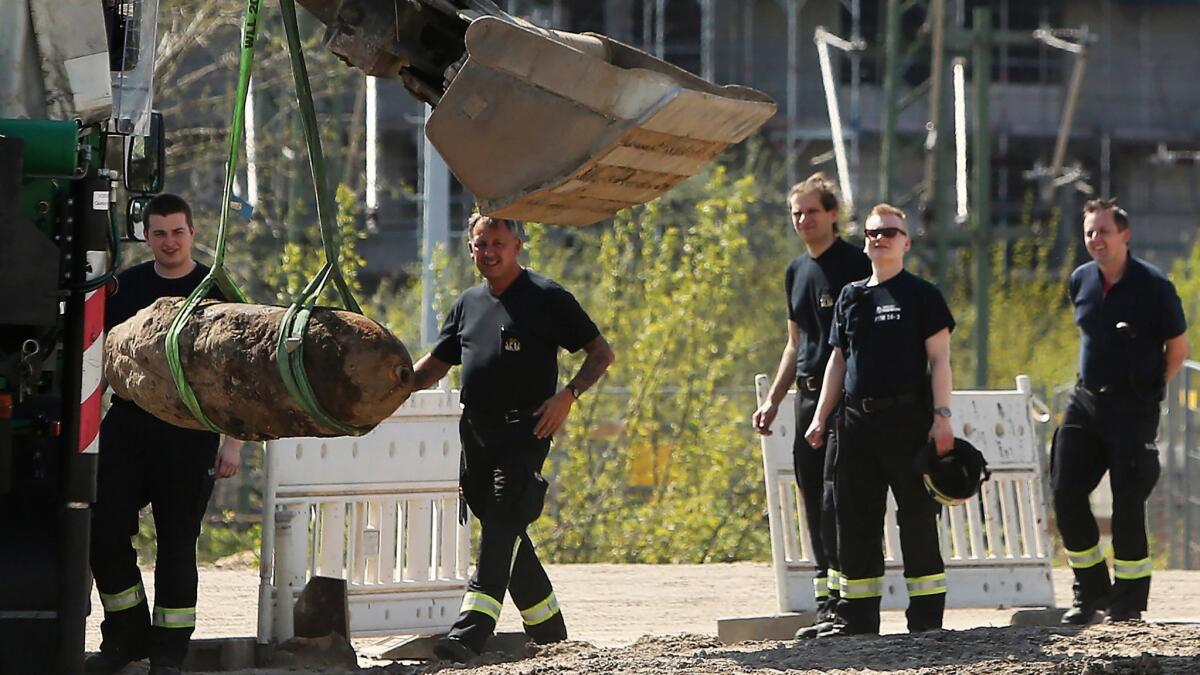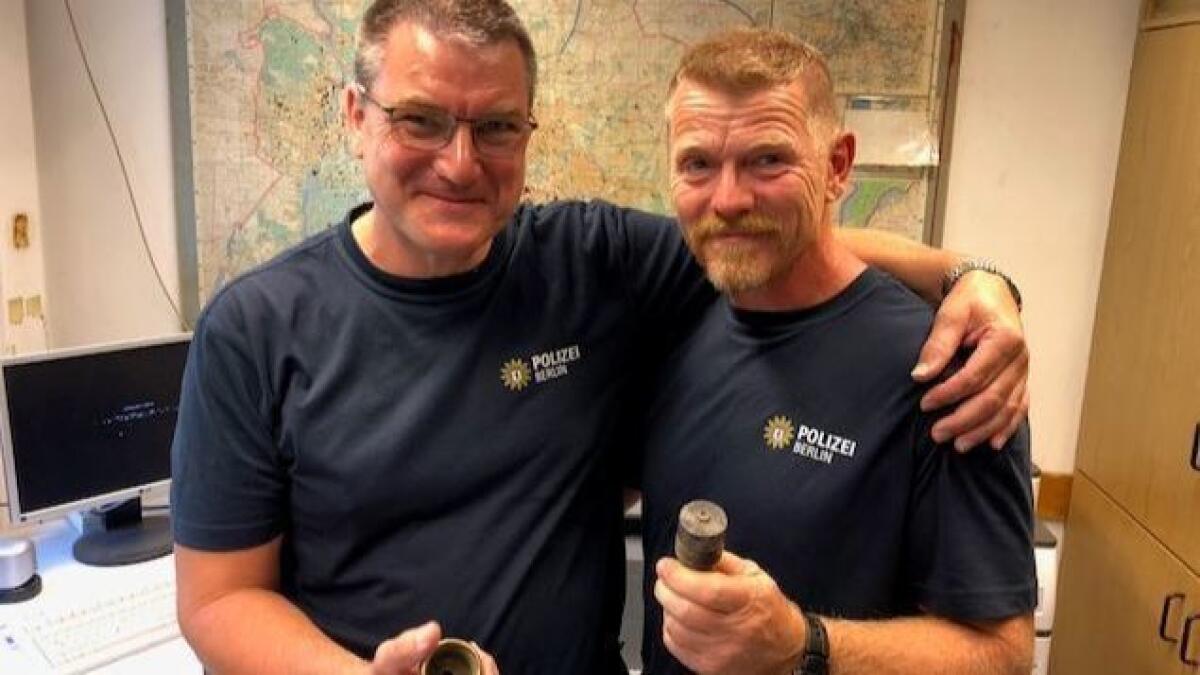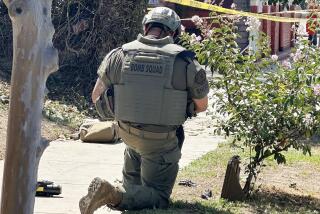In a city littered with World War II-era explosives, Berlin’s bomb squad is always on alert

- Share via
Reporting from Berlin — Dietmar Puepke decided, on his 39th birthday, to stop counting the number of rusting World War II bombs he defused with his bare hands. That same day, the head of the Berlin police department’s bomb squad had disabled, in quick succession, six unexploded 100-pounders dredged up from the bottom of a local city pond.
“When you start thinking about the numbers of bombs you deactivated, you start thinking about your first bomb and then whether the next bomb could be the last one,” Puepke said. “So I don’t count them anymore.”
Puepke, 53, and his remarkably serene team of six police bomb disposal experts are tasked with disarming the corroding American, British, Russian and German bombs, grenades and artillery shells that still litter the earth beneath Berlin more than 70 years after the fighting stopped. An estimated 500,000 bombs — or about 70,000 tons of munitions — were dropped on the Nazi capital during nearly 400 Allied aerial attacks by tens of thousands of British and American warplanes. An estimated 15% of the bombs failed to detonate and instead nosed into the ground, some up to 20 feet deep.
Historians estimate that at least 3,000 bombs are still buried under Berlin’s soil and tens of thousands of others scattered across the country.
The Berlin bomb squad gets called out about 900 times a year as city planners, construction workers or even backyard gardeners come across suspicious-looking objects lurking in the soil. Roughly a third of the time it turns out to be a live bomb, forcing the team to clear out the area within up to a mile of the device.
“In a worst-case scenario, we’re the ones who’d get blown up,” said Puepke, smiling at the gallows humor that prevails at the bomb squad’s headquarters. He said he first became interested in the remains of a long-ago war as a 5-year-old when his kindergarten class came across a rusting German army bazooka lying near a forest pathway.
“Everyone thought it was dangerous and ran away but I thought, ‘Wait a minute, dangerous? Why? What’s that all about? That’s interesting,’” he said.
The discoveries in Berlin of the many smaller unexploded devices rarely make headlines but on occasion, such as when a 500- or 1,000-pound bomb is unearthed, an entire neighborhood of the bustling German capital city is brought to a standstill. Thousands of people are evacuated and traffic is stopped or rerouted and Puepke and his team arrive to carefully disarm the weapon.
“It’s always an interesting challenge,” said Puepke, who joined the bomb squad 17 years ago and says he would never want to go back to a regular patrol beat. “There are always different circumstances such as where the bomb was found, what condition is it in, and what kind of bomb it is. You’ve got to have an idea of what you’re going to do and develop a concept each time on how you’re going to separate the detonator from the payload.
“It’s a dream job,” he added.

The mass evacuations and massive disruptions caused by the delicate bomb removal work may rattle tourists and foreigners in Berlin, but it seems oddly routine to many Germans who have learned to live with the disruptions and other, deleterious aftereffects of a war their grandparents or great-grandparents waged.
Like a scene from a horror film, the World War II bombs sometimes emerge from the ground on their own, working their way through the earth over the decades as the ground freezes and thaws. Their return to the surface provides a reminder of Germany’s wartime past.
But because the police’s bomb-defusing efforts almost always end successfully with at most a small bang when the possibly volatile detonator is deliberately detonated after being separated from the bomb, the inconvenience is usually eclipsed by a celebratory sense that another remnant of World War II has been rendered harmless.
In a country without an abundance of national heroes due to its belligerent past, Germany’s police bomb disposal officers seemed universally admired for their bravery.
“We simply love what we’re doing,” said Thomas Mehlhorn, 53, another Berlin bomb disposal expert who switched to the police department two decades ago from a career in mechanical engineering. He and others on the team insist it’s not the modest extra pay of about $200 per month known as Gefahrenzulagen — hazardous duty bonus — that makes the job so incongruently attractive.
“There’s just something really special about it,” said Mehlhorn, who like Puepke prefers the finely crafted brass detonators they unscrew or cut off from the British bombs to the more simplified American brass detonators. They both despise the especially treacherous Langzeitzuender or long-delay detonators designed to go off long after impact. The deactivated sections of the bombs are ultimately transported to a disposal site in the Grunewald forest, buried and then destroyed in a controlled blast.
“Sure, there’s danger involved, but you try to block that out,” Mehlhorn said. “I ride a motorcycle, and I would say that’s more dangerous. The work we do is simply a lot of fun. I’m always looking forward to the next bomb.”
It is nevertheless a perilous job. In 2010, three police officers in the university town of Goettingen west of Berlin were killed while preparing to defuse a 1,000-pound bomb. Two others were killed in the western state of Hesse in 1990 while disabling another unexploded bomb. In 2006, a highway construction worker was killed when his cutting machine detonated another bomb, and in Berlin three construction workers were killed in a similar accident.
The last big bomb found in Berlin was defused near the busy central train station on April 20. More than 10,000 were evacuated and 300,000 train passengers faced delays. Puepke and his team posed for photographers with the remains of the British aerial bomb after the detonator was cut off.
One of the biggest bombs found was a 4,000-pound “blockbuster” dropped by the British Royal Air Force on Frankfurt. It was defused last year and 65,000 people had to be evacuated. More than 50,000 were evacuated on Christmas Eve in Augsburg in 2016 while another dud was deactivated. In 2012, a 500-pound American bomb found in Munich could not be defused and police had to detonate it in a controlled explosion that went awry — the fireball caused millions of dollars in damage to 17 nearby buildings.
“Every police officer has a dangerous job,” said Puepke. “My wife used to be more worried when I had to go out to demonstrations because there was a chance of maybe getting hit with a Molotov cocktail. She says if I’m not afraid, then she’s not afraid either.”
Kirschbaum is a special correspondent.
More to Read
Sign up for Essential California
The most important California stories and recommendations in your inbox every morning.
You may occasionally receive promotional content from the Los Angeles Times.










